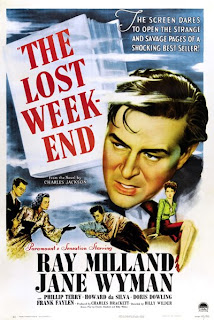The Lost Weekend

1945 kicked off a short spurt of socially relevant films to win Oscar's Best Picture. The winner that year was The Lost Weekend, directed by Billy Wilder, about one man's dilly of a rye bender. Alcoholism has long been catnip for Oscar, as many performers have won for playing drunks, including Ray Milland in the lead performance here. Before Milland had even been cast, Wilder predicted that whoever played the part would win the Best Actor Oscar.
The genesis of the project was Wilder picking up a book to read on a cross-country train ride. By the time he got to New York he had read Charles Jackson's novel and started making notes about the film version. In the book, the main character, Don Birnam, is a habitual drinker because of a homosexual incident in college. Of course this was completely scrubbed from the film. Instead we're led to believe he's a drinker because he never lived up to early promise as a writer.
This film is fascinating to watch, not always because it's good. It has the look and feel of a sensational B-picture, a kind of dandified Reefer Madness. It was the first film to use the theremin in the musical score, and since that instrument is so identified with sci-fi films from the fifties whenever it's spooky whine intrudes on the action I was tempted to giggle.
But, as with almost any Wilder film, there are some masterful touches. The very opening shot pulls in on Milland's apartment window, where he can be seen packing a suitcase. Noticeable in the frame is a rope hanging out the window with a bottle tied to it. It isn't focused on, just there. There is also a great scene in which Milland searches for a bottle of rye he knows he hid but has forgot where. Finally, lying on the floor, he looks up and sees the light from the chandelier on the ceiling, the shape of the bottle silhouetted.
Also in the cast are Jane Wyman, as Milland's long-suffering girlfriend. Wilder seems to acknowledge that her character is a little too saintly, and there are frequent attempts to make her a bit less spineless, but she's still hard to believe anyway. More nuanced is Milland's brother, Philip Terry, who is at first an enabler but then finally washes his hands of things. Another fine performance is by Howard DaSilva as the local bartender. Milland, of course, gives a tour de force, an intelligent man who realizes he is no match for his demons.
Some scenes do not work, though it is not really Wilder's fault. A scene in which Milland hallucinates a bat attacking a mouse is frightening except for the ridiculously fake bat, which must have been re-used years later in a Munsters episode.


This film inspired one of my favorite Warner Brothers cartoon gags. In a star-filled nightclub, Milland gives his typewriter to the bartender as payment for his drink. The bartender says, "your change, Mr. Milland" and proceeds to put a few tiny typewriters on the bar. Genius.
ReplyDelete